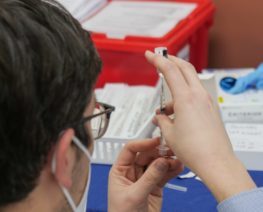With just more than half of the U.S. adult population fully vaccinated, most organizations are encouraging, but not requiring, that their employees receive the vaccine. Health care executives, however, have thus far been more prone to mandating vaccines and some employees have refused to comply or protested.
Houston Methodist Hospital, for example, mandated that its employees be vaccinated by June 7. That led to more than 178 of the 26,000 employees reportedly refusing the shot and then being suspended without pay, which resulted in the highest profile lawsuit to date. A federal judge in Texas dismissed the case on Saturday, saying that anyone who doesn’t agree with Houston Methodist’s policy is free to no longer work there.
Workers at Indiana University Health protested the institution’s policy that employees have to be vaccinated by September. And NewYork-Presbyterian issued a vaccine mandate late last week that requires all employees to receive a first dose by September 1.
“Legal experts say such vaccine requirements, particularly in a public health crisis, will probably continue to be upheld in court as long as employers provide reasonable exemptions, including for medical conditions or religious objection,” the Associated Press reported.
Mandates are not the only way to entice employees to receive a vaccine. Seventy two percent of executives across industries, in fact, indicated that they do not plan to require employees to be vaccinated before returning to the workplace, according to a survey of 660 employers, accounting for some 5.3 million employees conducted by Willis Towers Watson.
Increasing vaccine uptake in diverse communities: A guide for CEOs
The research also determined that 82 percent of employers are communicating the value of vaccines to employees to encourage vaccine uptake. Beyond communication, 86 percent of organizations are providing scheduling flexibility, 62 percent are considering or providing pay for the time employees spend getting vaccinated and 20 percent are either already providing or considering adding additional financial incentives for employees who get vaccinated.
Taking matters further, 40 percent have already implemented programs to increase vaccination rates in populations otherwise unlikely to receive a shot, and 21 percent are considering similar programs, while 59 percent are currently considering establishing near- or on-site options for vaccination. For employees who receive the vaccine and experience a negative reaction, 58 percent of employers are thinking about offering additional leave.
“By encouraging vaccinations, employers are demonstrating their commitment to employee safety and wellbeing,” said Jeff Levin-Scherz, MD, population health leader, Willis Towers Watson, in a statement. “Taking various approaches and using clear, targeted communications about the importance of vaccination will enable employers to protect employees, their families and the community. It will also help speed the transition to a post-pandemic future.”
That said, hospitals and health systems face unique safety conditions distinct from other industries and executives need to strike a balance between safety and the impact of policies requiring vaccines on the workforce.
“Hospitals need to weigh pending appeals and worker attitudes,” Jean Moore, DrPH, Director, The Center for Health Workforce Studies, at the State University of New York, Albany’s School of Public Health, told MarketWatch. “Though hospitals might not want to force the issue, the safety of other patients and workers are at stake.”










